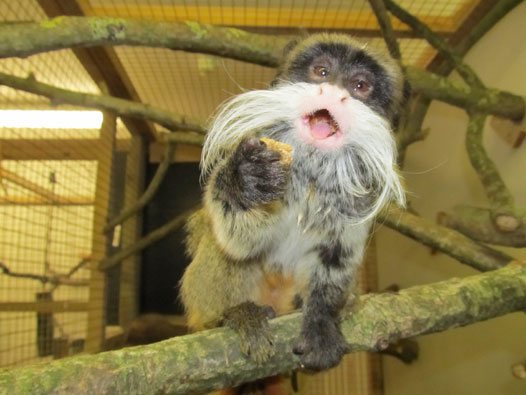Movember Comes to Flamingo Land!

Flamingo Land has welcomed a new female emperor tamarin into their animal collection. She has been transferred from Dudley Zoo will be paired up with the male already here. The hope is that they will breed in the near future and contribute towards their species’ breeding programme. At the moment the zoo keepers are slowly introducing the pair together, therefore they are currently being kept off-show. Once the pair are settled together and their new enclosure has been completed, they will be moved into the visible area of the zoo.
Emperor tamarins are small primates with very distinctive white fur in the form of a ‘moustache’. Male, female and infant tamarins all have the moustache, so they are a perfect animal to tie in with ‘Movember’! These animals will not have their moustaches shaven off at the end of the month though, as they retain all of their fur all year round with the rest of their body being a grey-brown colour.
Most primates are social animals, therefore in the wild the emperor tamarin would be found in groups of around 4-15 individuals within the Amazon rainforest. There would only be one dominant breeding female who would mate with multiple males. She would also release pheromones and exhibit dominant behaviour over the other females within the group to prevent them from being able to breed. After mating, the female would be pregnant for 4-5 months and give birth to twins. The young would be carried around by all members of the group until they are about 2 months old and they would reach their fully grown size by the time they are 2 years old.
The emperor tamarins’ status is considered to be least concern, however habitat destruction and the construction of roads is having a negative effect on their population numbers. Emperor tamarins, along with many other primate species, are captured to support the exotic pet trade. This can be stressful for both the young and parent if they are separated, or they may not have high levels of welfare and the correct social interactions in their new captive environment.
Lindsay Taylor – Education Officer


